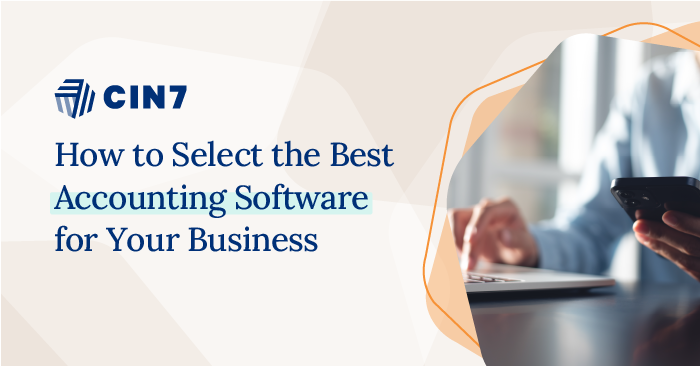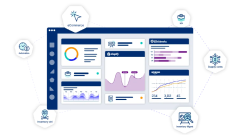
Finding, researching, and selecting the right accounting tool for your small or medium-sized business is an important, business-growing task.
As a new business, you must take certain steps to get started, and according to the U.S. Small Business Administration, those 10 steps are:- Conducting market research
- Writing a business plan
- Funding your business
- Picking your business plan
- Choosing a business structure (e.g., sole proprietor, partnership, limited liability company (LLC), etc.)
- Choosing your business name
- Registering your business
- Getting federal/state tax IDs
- Applying for licenses and permits
- Opening a bank account.
But there’s an important step 11: Finding and selecting the right accounting tool for your business.
The question is, which solution falls into the “right” category?
We’ll help you answer this question by offering valuable insights into how to choose a solution that matches your specific needs—especially when there are plenty of seemingly good-sounding options out there.
Key Considerations When Choosing an Accounting Tool
A comprehensive accounting solution helps you effectively manage, digitize, and automate your business-wide finances. In a nutshell, it helps you keep accurate records, handle your financial reporting, fulfill your tax requirements, and make sound financial decisions based on factual information. Forbes contributor Melissa Houston takes it one step further, declaring that your accounting practices (which are affected by your accounting solution) will influence business success.
“Accounting is undoubtedly one of the most crucial components of running a successful business. It's impossible to overlook the significance of keeping track of your finances,” she writes. “With a clear understanding of your financial data, you can make data-driven decisions, optimize your spending, and avoid potential cash flow issues. And in today's fast-paced business environment, effective financial management can mark the difference between growth and stagnation.”
No business wants to stagnate and do so because of poor accounting performance, which means you need an accounting tool that’s on point. With this in mind, here are some things you should keep top of mind when picking an accounting solution that might just end up being your business’s best friend.
1. Take Your Business Size and Budget into Account
The size of your business is a major component to deciding which accounting solution will work for you. Are you a freelancer? A small business? A midsized business?
The smaller the business, the more likely you’ll have simpler accounting and bookkeeping requirements (vs. larger business with more complex and specialized needs). You may be able to manage all your accounting needs via your accounting solution, but—and this is important—having an accounting and tax professional on your side is always recommended.
When researching your accounting system options, look for one that is marketed towards small businesses while also taking your budget into account. There are free accounting systems available (e.g., Akaunting, Wave Accounting, Zoho Books, and more), but often, it’s only free for its most basic capabilities.
Do your due diligence before making any decisions. Free is great, but not if the free option can’t scale with you or offer the accounting features essential to your operation—which leads us to consideration #2.
2. The Accounting Features Your Accounting Solution Must Provide
Every accounting solution you evaluate will likely provide General Ledger management, Accounts Payable/Receivable, and Financial Statement capabilities. But we recommend making sure it also has the following features:
- Invoicing: Sending invoices for your goods and/or services is an essential part of doing business. Your accounting solution should keep your financial records crystal clear, streamline your billing process, and keep you on top of those tax regulations.
- Expense tracking: Digitally keeping track of your expenses helps you keep tabs on where your money is going so that your finances, costs, and budget stay in shipshape—a task that should be captained by your accounting solution.
- Payroll: Payroll is a specific and necessary (according to the law and your employees) accounting procedure, but not all accounting solutions offer payroll functionality. The solution you choose should provide either a user-friendly and connected payroll application or the ability to integrate with a third-party payroll provider.
- Tax compliance: Sadly, paying taxes is also a specialized and necessary accounting task. With the right accounting tool, you can simplify, automate, and streamline your tax preparation, filing, and payment chores.
3. Make Integration a Priority
Typically, small businesses begin their journey with multiple software applications, including those for project management, customer relationship management (CRM), e-commerce, and yes, accounting. For you to enjoy a stress-and-hassle-free existence as a business owner, your various applications must work as a team.
Unfortunately, that’s not always possible, so you’ll want to look for an accounting solution that can seamlessly and easily integrate with your necessary business applications.
Accounting Solution Options
Taking the size of your business and budget, the must-have features, and integration needs into consideration is key, but you must also ensure that the solution you choose is easy to use and offers outstanding customer support. Here are a few accounting solution options that may fit the bill.
QuickBooks: QuickBooks is a versatile accounting solution created by Intuit to cater to businesses of all sizes. It’s known for being user friendly, affordable, and having over 700 business application integrations. QuickBooks can help you with almost everything including:
- Managing finances
- Tracking expenses
- Managing inventory
- Automating tasks (e.g., invoicing, payments, and payroll)
- Simplifying tax preparation
Xero: Xero is a financial management platform designed to grow with your business. Perfect for small to medium-sized companies, Xero offers a robust suite of features:
- Online invoicing and payments
- Seamless bank connections and reconciliation
- Inventory tracking
- Detailed reporting
- Payroll integration (powered by Gusto)
- Flexible quote management
Whether you're a startup or an expanding enterprise, Xero provides the financial flexibility you need.
Avalara: Avalara is tax compliance software that streamlines customer experiences and simplifies vendor management. Businesses of all sizes can use Avalara for their critical tax compliance needs, including:
- Returns preparation and filing
- Tax research
- Business license management
- Property tax
- And more
Avalara—with its more than 1,200 partner integrations—is dedicated to making tax compliance faster, easier, and more affordable for every business.
Accountfully: Accountfully is an outsourced bookkeeping and accounting firm that promises to make accounting “more strategic, more proactive, and yes, even a little fun.” Its wide range of core and complimentary services are designed to ensure growth, success, and stability.
- Outsourced Accounting
- Tax Services
- Inventory Consulting Services
- Finance and Advisory
- Bookkeeping and Controller Services
- Distributor Deductions Management
Growing small and mid-sized businesses can trust that Accountfully will help them earn funding, maximize tax outcomes, plan for growth, and stay profitable.
Why Cin7 is a Good Partner for Your Accounting Software
A robust accounting tool is vital to helping your business fly in today’s uncertain economy. The size of business (and budget), features you need, and integration capabilities all play a major role when deciding which accounting system to use. For product based businesses like you, there’s an extra layer to consider: how your accounting system works with your inventory management software.
Enter Cin7.
Cin7 is designed to streamline your business operations! You’ll gain:
- Real-Time Inventory Management: Automatically syncs inventory levels with accounting software, prevents overselling by keeping stock data updated, and helps track stock across multiple locations or warehouses.
- Automated Financial Data Sync: Sales, purchases, and expenses recorded in Cin7 are automatically reflected in accounting software, manual data entry is reduced and errors are minimized, and financial reports are always accurate.
- Improved Order & Sales Tracking: Connects e-commerce platforms (Shopify, Amazon, eBay) with accounting tools, matches orders with invoices and payments in real-time, and helps reconcile sales data quickly.
- Better Cash Flow Management: Real-time cost and profit tracking for better financial planning and accurate tax calculations by syncing revenue and expense data.
- Enhanced Reporting & Business Insights: Combines inventory, sales, and financial data for deeper insights and helps business owners make informed pricing and purchasing decisions.
- Saves Time & Reduces Errors: Eliminates manual double-entry of sales, invoices, and stock levels and reduces administrative workload, allowing SMBs to focus on growth.
And you’ll have Cin7 Pay, an embedded payment solution powered by Stripe that enables you to accept multiple payment options, such as credit cards, ACH, digital wallets, and more. From streamlined payment processing and reduced manual work to enhanced cash flow, you’ll boost revenue, simplify operations, and enhance your customers’ experience.
Importantly, it seamlessly integrates industry-leading platforms like:
- QuickBooks
- Xero
- Avalara
- Accountfully
Plus, we have a robust ecosystem of implementation partners, such as BlueHub, SMB Consultants, Symphony Development Group, Mendelson Consulting, Fiskal Finance to name a few. They’re here to make sure you start your Cin7 journey with a unified, efficient tech stack.
Between your carefully selected accounting tool and Cin7, you’ll be setting yourself up for success. Cin7 customer Raymond Siebrits, Manager at Klein River Cheese says, “Cin7 Core doesn’t do it all, but it’s not trying to do it all. The fact that it integrates seamlessly with other best-in-class platforms, for example, Xero for accounting or WooCommerce for e-commerce—that would be one of the best features that I’ve enjoyed.”
He adds: “I think we’ve got a good system running with our accounting platform. With Xero and its seamless integration into Cin7 Core’s ERP, [it] will start to show us exactly where our product is … [and] what the trends are.”
Learn more about how your accounting software of choice can work wonders for your business by partnering with Cin7. Request a free demo today.
More from the blog
View All Posts
The ROI of Using an ERP System for Accounting: What You Need to Know
Read More
How to select the right warehouse management system for your business
Read More


